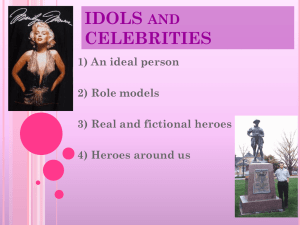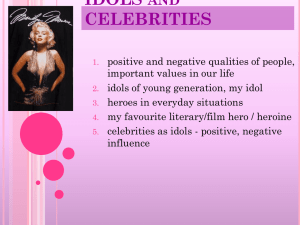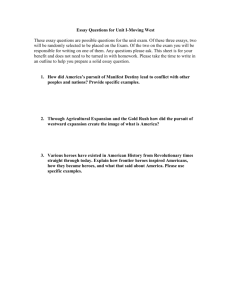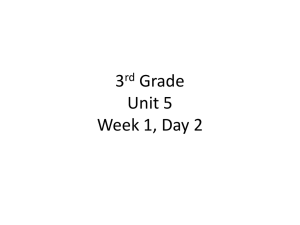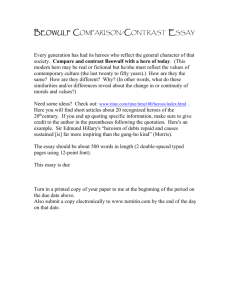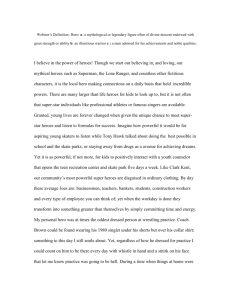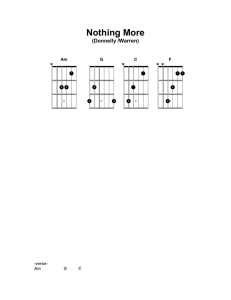Who are the heroes of today?
advertisement
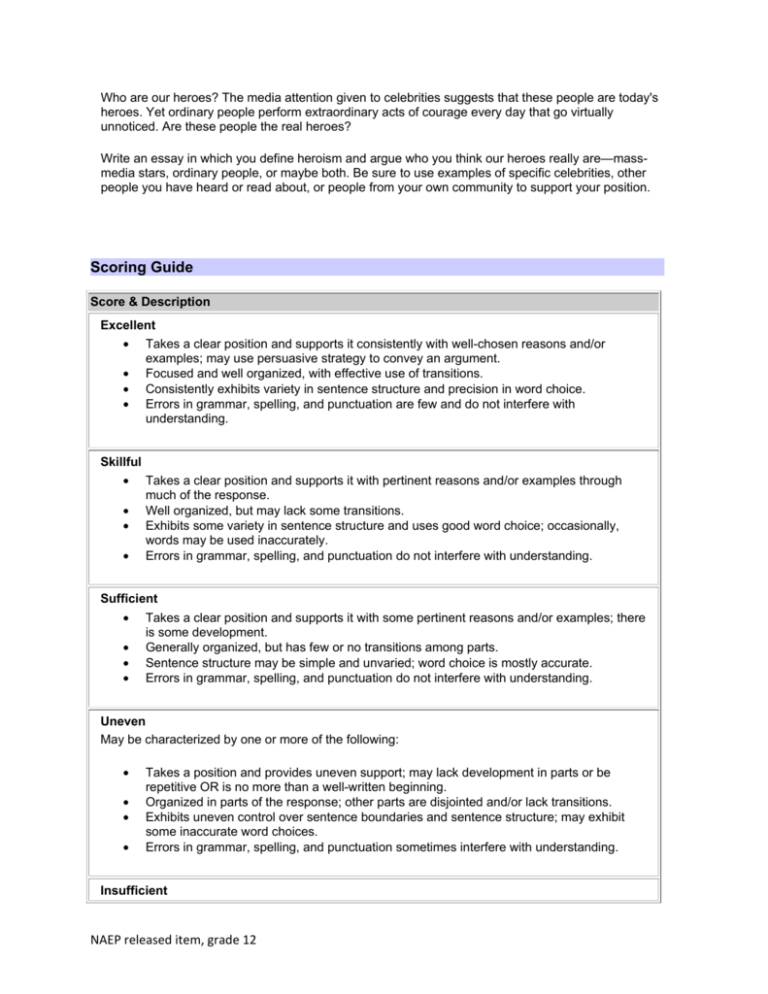
Who are our heroes? The media attention given to celebrities suggests that these people are today's heroes. Yet ordinary people perform extraordinary acts of courage every day that go virtually unnoticed. Are these people the real heroes? Write an essay in which you define heroism and argue who you think our heroes really are—massmedia stars, ordinary people, or maybe both. Be sure to use examples of specific celebrities, other people you have heard or read about, or people from your own community to support your position. Scoring Guide Score & Description Excellent • • • • Takes a clear position and supports it consistently with well-chosen reasons and/or examples; may use persuasive strategy to convey an argument. Focused and well organized, with effective use of transitions. Consistently exhibits variety in sentence structure and precision in word choice. Errors in grammar, spelling, and punctuation are few and do not interfere with understanding. Skillful • • • • Takes a clear position and supports it with pertinent reasons and/or examples through much of the response. Well organized, but may lack some transitions. Exhibits some variety in sentence structure and uses good word choice; occasionally, words may be used inaccurately. Errors in grammar, spelling, and punctuation do not interfere with understanding. Sufficient • • • • Takes a clear position and supports it with some pertinent reasons and/or examples; there is some development. Generally organized, but has few or no transitions among parts. Sentence structure may be simple and unvaried; word choice is mostly accurate. Errors in grammar, spelling, and punctuation do not interfere with understanding. Uneven May be characterized by one or more of the following: • • • • Takes a position and provides uneven support; may lack development in parts or be repetitive OR is no more than a well-written beginning. Organized in parts of the response; other parts are disjointed and/or lack transitions. Exhibits uneven control over sentence boundaries and sentence structure; may exhibit some inaccurate word choices. Errors in grammar, spelling, and punctuation sometimes interfere with understanding. Insufficient NAEP released item, grade 12 May be characterized by one or more of the following: • • • • Takes a position but is very undeveloped. Disorganized or unfocused in much of the response OR clear but very brief. Minimal control over sentence boundaries and sentence structure; word choice may often be inaccurate. Errors in grammar, spelling, and punctuation interfere with understanding in much of the response. Unsatisfactory May be characterized by one or more of the following: • • • • Attempts to take a position (addresses topic) but position is very unclear OR takes a position but provides minimal or no support; may only paraphrase the prompt. Little or no apparent organization. Minimal or no control over sentence boundaries and sentence structure; word choice may be inaccurate in much or all of the response. Errors in grammar, spelling, and punctuation severely impede understanding across the response. Excellent - Student Response 1.Who are our heroes? The media attention given to celebrities suggests that these people are today's heroes. Yet ordinary people perform extraordinary acts of courage every day that go virtually unnoticed. Are these people the real heroes? Write an essay in which you define heroism and argue who you think our heroes really are—massmedia stars, ordinary people, or maybe both. Be sure to use examples of specific celebrities, other people you have heard or read about, or people from your own community to support your position. NAEP released item, grade 12 NAEP released item, grade 12 Scorer Comments: Excellent responses offered consistent support for their positions in the form of well-chosen reasons and examples. In the sample response below, the writer uses the strategy of question/answer to advance and maintain the focus of his or her argument: "So, what about the sports stars we call heroes?" The response is also outstanding in its consistent variety in sentence structure and precise word choices. Skillful - Student Response 1.Who are our heroes? The media attention given to celebrities suggests that these people are today's heroes. Yet ordinary people perform extraordinary acts of courage every day that go virtually unnoticed. Are these people the real heroes? Write an essay in which you define heroism and argue who you think our heroes really are—massmedia stars, ordinary people, or maybe both. Be sure to use examples of specific celebrities, other people you have heard or read about, or people from your own community to support your position. NAEP released item, grade 12 NAEP released item, grade 12 Scorer Comments: Skillful responses took clear positions and supported them with reasons or examples in parts of the response. The response shown below supports a clear position with pertinent examples (such as the friend's grandmother) in much of the response. The paper is well organized overall, but does not consistently exhibit well-executed sentence variety or good word choices. Sufficient - Student Response 1.Who are our heroes? The media attention given to celebrities suggests that these people are today's heroes. Yet ordinary people perform extraordinary acts of courage every day that go virtually unnoticed. Are these people the real heroes? Write an essay in which you define heroism and argue who you think our heroes really are—massmedia stars, ordinary people, or maybe both. Be sure to use examples of specific celebrities, other people you have heard or read about, or people from your own community to support your position. NAEP released item, grade 12 NAEP released item, grade 12 Scorer Comments: "Sufficient" responses took clear positions and developed those positions with some pertinent reasons or examples. Ideas were generally related with few transitions. The response below makes a clear argument that heroes are those who perform courageous acts, but lacks development and is only generally organized, due to an absence of transitions among ideas. Uneven - Student Response 1.Who are our heroes? The media attention given to celebrities suggests that these people are today's heroes. Yet ordinary people perform extraordinary acts of courage every day that go virtually unnoticed. Are these people the real heroes? Write an essay in which you define heroism and argue who you think our heroes really are—massmedia stars, ordinary people, or maybe both. Be sure to use examples of specific celebrities, other people you have heard or read about, or people from your own community to support your position. NAEP released item, grade 12 Scorer Comments: "Uneven" responses took a clear position and offered support, but that support was often lacking in development. This response also has some typical "Uneven" grammatical errors, inaccurate word choices, and some minor difficulties with sentence structure that occasionally interfere with understanding. Insufficient - Student Response 1.Who are our heroes? The media attention given to celebrities suggests that these people are today's heroes. Yet ordinary people perform extraordinary acts of courage every day that go virtually unnoticed. Are these people the real heroes? NAEP released item, grade 12 Write an essay in which you define heroism and argue who you think our heroes really are—massmedia stars, ordinary people, or maybe both. Be sure to use examples of specific celebrities, other people you have heard or read about, or people from your own community to support your position. Scorer Comments: "Insufficient" responses attempted to take positions and offer support but were very brief, disorganized, or marked by severe errors in sentence control and/or grammar. The "Insufficient" response below is underdeveloped. Unsatisfactory - Student Response 1.Who are our heroes? The media attention given to celebrities suggests that these people are today's heroes. Yet ordinary people perform extraordinary acts of courage every day that go virtually unnoticed. Are these people the real heroes? Write an essay in which you define heroism and argue who you think our heroes really are—massmedia stars, ordinary people, or maybe both. Be sure to use examples of specific celebrities, other people you have heard or read about, or people from your own community to support your position. Scorer Comments: "Unsatisfactory" responses responded to the prompt but either had positions that were very unclear or offered no coherent support for a position. The response below has errors in sentence structure and word choice severe enough to interfere with understanding across the response. 2002 National Performance Results Score NAEP released item, grade 12 Percentage of Students Unsatisfactory 3% Insufficient 9% Uneven 23% Sufficient 34% Skillful Excellent 22% 9% Note: • • These results are for public and nonpublic school students. Percentages may not add to 100 due to rounding. Purpose for Writing Persuasive Writing Persuasive writing emphasizes the reader. Its primary aim is to influence others to take some action or to bring about change. Persuasive writing may contain much information — facts, details, examples, comparisons, statistics, or anecdotes. Its main purpose, however, is not simply to inform but to persuade. This type of writing involves a clear awareness of what arguments might most affect the audience being addressed. Writing persuasively also requires the use of critical thinking skills such as analysis, inference, synthesis, and evaluation. Persuasive writing is called for in a variety of situations. It may involve responding to a request for advice by giving an opinion and providing sound reasons to support it. It may also involve presenting an argument in such a way that a particular audience will find it convincing. When there is opposition, persuasive writing may entail refuting arguments that are contrary to the writer's point of view. In all persuasive writing, authors must choose the approach they will use. They may, for instance, use emotional or logical appeals or an accommodating or demanding tone. Regardless of the situation or approach, persuasive writers must be concerned with having a particular desired effect upon their readers, beyond merely adding to knowledge of the topic presented. NAEP released item, grade 12
